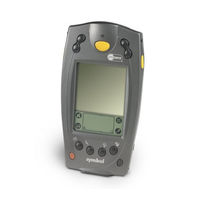Symbol SPT 1742 Manuals
Manuals and User Guides for Symbol SPT 1742. We have 1 Symbol SPT 1742 manual available for free PDF download: Product Reference Manual
Symbol SPT 1742 Product Reference Manual (394 pages)
SPT 1700 Series
Table of Contents
-
-
Introduction27
-
-
Bottom View29
-
Back View29
-
Top View29
-
-
-
-
-
Introduction53
-
-
Merlin Menu65
-
-
Ping Screen73
-
Help Menu74
-
-
-
-
Introduction79
-
Applications79
-
-
Using Menus96
-
Using Categories100
-
Attaching Notes105
-
-
Introduction109
-
Chapter Contents109
-
-
-
Introduction111
-
-
-
Introduction117
-
-
Record Menu126
-
Options Menu127
-
-
-
-
Introduction137
-
-
Record Menu151
-
Options Menu153
-
-
-
-
Introduction157
-
Opening Expense157
-
Using Expense158
-
Show Options163
-
-
-
Record Menu170
-
Options Menu171
-
-
-
Introduction175
-
-
Using File Link180
-
-
-
Introduction199
-
-
Options Menu204
-
-
-
-
Introduction207
-
Avantgo Client207
-
-
Channels Menu214
-
Go Menu215
-
Options Menu215
-
-
Mobile Link216
-
Servers Tab217
-
-
Server Address218
-
Your Account219
-
-
-
Connection Tab220
-
-
Server Menu225
-
Options Menu225
-
-
Troubleshooting226
-
-
-
Introduction229
-
Viewing Messages231
-
Sending Messages240
-
Draft Messages242
-
Filing a Message243
-
-
Folders245
-
Date Column246
-
-
Hotsync Options247
-
-
Message Menu254
-
Options Menu255
-
-
-
-
Introduction259
-
Reviewing Memos261
-
Arranging Memos261
-
Deleting a Memo263
-
-
Record Menu264
-
Options Menu265
-
-
-
-
Introduction269
-
-
Auto-Off278
-
Trigger Wake278
-
Beam Receive279
-
-
Idle Timeout287
-
IP Address289
-
-
Service Menu293
-
Options Menu293
-
-
-
-
-
Introduction309
-
-
Record Menu316
-
Options Menu317
-
-
-
-
Introduction321
-
-
-
Chapter Contents329
-
Introduction331
-
Using Gsmdemo331
-
-
Options Menu339
-
Help Menu340
-
-
-
-
Introduction351
-
Troubleshooting357
-
-
-
-
Use of ^Char385
-
-
Examples386
-
-
Advertisement
Advertisement
